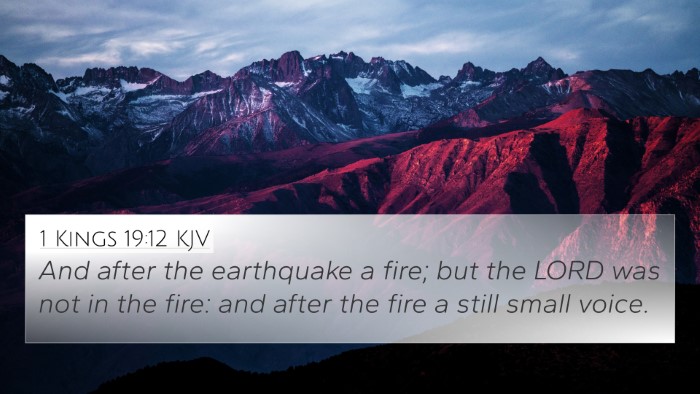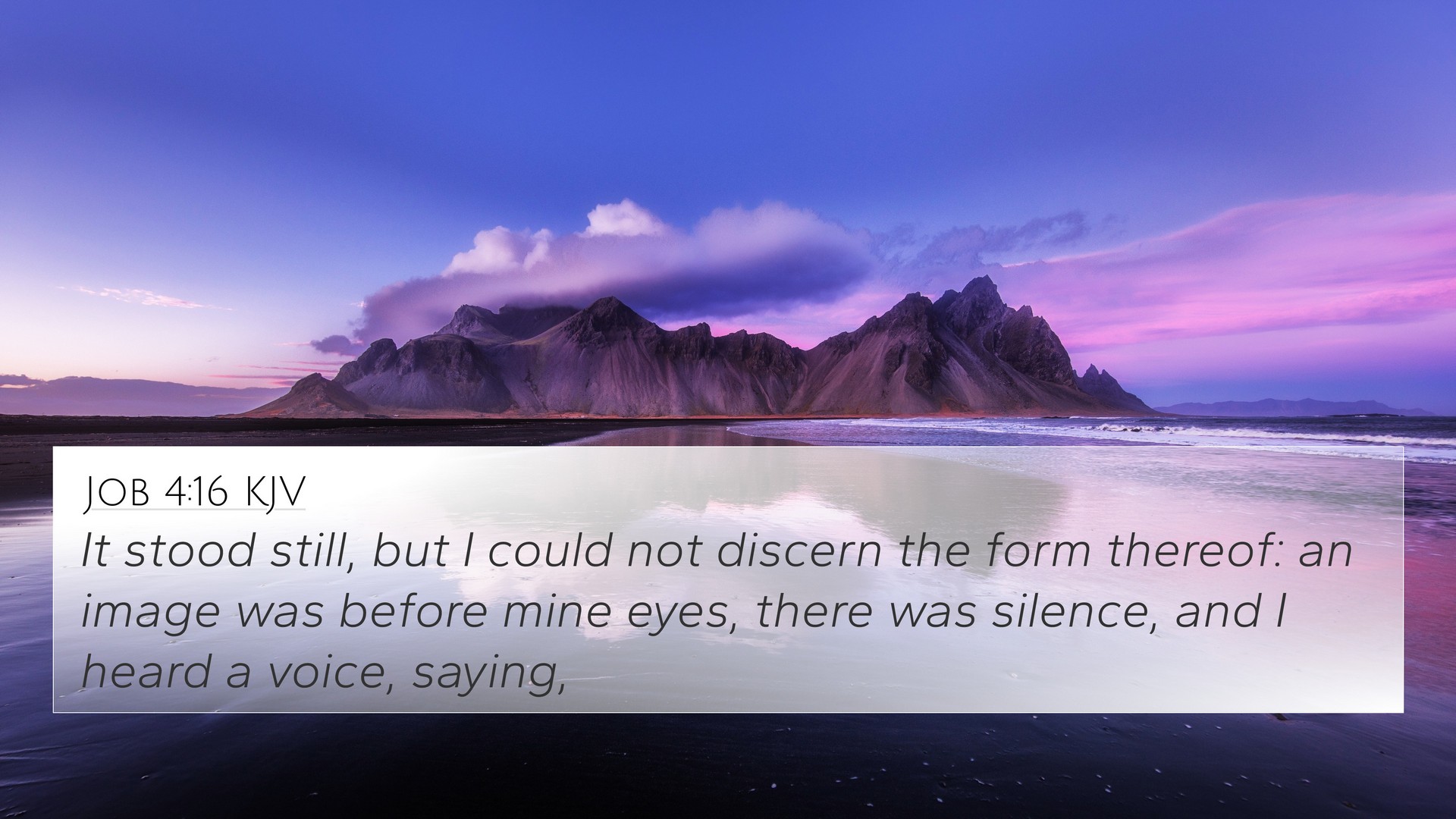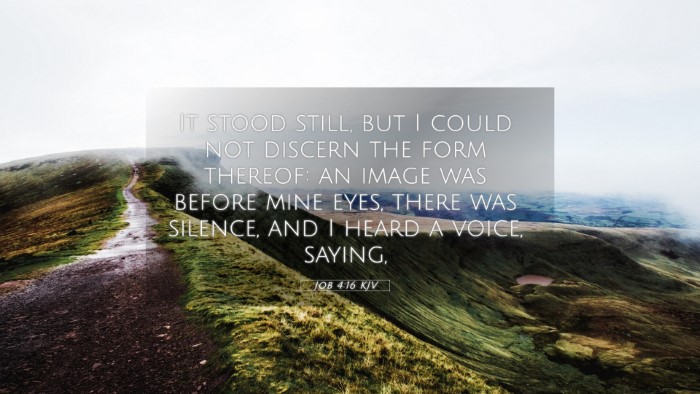Old Testament
Genesis Exodus Leviticus Numbers Deuteronomy Joshua Judges Ruth 1 Samuel 2 Samuel 1 Kings 2 Kings 1 Chronicles 2 Chronicles Ezra Nehemiah Esther Job Psalms Proverbs Ecclesiastes Song of Solomon Isaiah Jeremiah Lamentations Ezekiel Daniel Hosea Joel Amos Obadiah Jonah Micah Nahum Habakkuk Zephaniah Haggai Zechariah MalachiJob 4:16 Similar Verses
Job 4:16 Cross References
It stood still, but I could not discern the form thereof: an image was before mine eyes, there was silence, and I heard a voice, saying,
Uncover the Rich Themes and Topics of This Bible Verse
Listed below are the Bible themes associated with Job 4:16. We invite you to explore each theme to gain deeper insights into the Scriptures.
Job 4:16 Cross Reference Verses
This section features a detailed cross-reference designed to enrich your understanding of the Scriptures. Below, you will find carefully selected verses that echo the themes and teachings related to Job 4:16 KJV. Click on any image to explore detailed analyses of related Bible verses and uncover deeper theological insights.

1 Kings 19:12 (KJV) »
And after the earthquake a fire; but the LORD was not in the fire: and after the fire a still small voice.
Job 4:16 Verse Analysis and Similar Verses
Understanding Job 4:16 - A Comprehensive Study
The verse Job 4:16 reads: "It stood still, but I could not discern the form thereof: an image was before mine eyes, there was silence, and I heard a voice, saying." This passage captures a profound moment in which Job's friend Eliphaz recounts a mystical experience, suggesting a deep and unsettling encounter with the divine or spiritual realm.
Verse Context and Insights
To grasp the full meaning of Job 4:16, it is beneficial to consider its context within the Book of Job. This book deals with themes of suffering, faith, and the mystery of God’s sovereignty. Eliphaz's reflections indicate a moment of spiritual insight, hinting at the indirect way in which God communicates with humans.
- Silence and Divine Presence: The 'silence' suggests an awe-inspiring moment where the spiritual world intrudes upon Job's reality, pointing towards the often quiet, yet powerful nature of divine encounters.
- Vision and Understanding: Eliphaz's inability to discern form may indicate the ineffability of God; He cannot be fully understood or contained within human understanding.
- The Voice of God: The aspect of 'hearing a voice' introduces the concept that God may communicate through impressions or revelations, rather than direct conversation.
Cross-References and Thematic Connections
Job 4:16 can be cross-referenced with several key Bible verses, enriching our understanding of its meaning:
- 1 Kings 19:12: "And after the earthquake a fire; but the LORD was not in the fire: and after the fire a still small voice." - This shows God's preference for addressing His people in softer ways rather than through catastrophic events.
- Psalms 46:10: "Be still, and know that I am God." - This ties into the theme of divine silence, where stillness precedes the revelation of God's presence.
- Isaiah 6:1-5: Isaiah's vision of God reveals the awe that comes from divine encounters, similar to the experience depicted by Eliphaz.
- Exodus 33:20: "Thou canst not see my face: for there shall no man see me, and live." - The inability to fully comprehend God's nature echoes in Job's experience.
- Genesis 28:16: "And Jacob awaked out of his sleep, and he said, Surely the LORD is in this place; and I knew it not." - This speaks to the theme of divine revelation in moments of unawareness.
- Hebrews 12:26-29: This speaks of God’s voice that shakes the earth, which points to the power and authority behind God's communications.
- Revelation 1:17: "And when I saw him, I fell at his feet as dead." This indicates the overwhelming nature of divine encounters, reinforcing Eliphaz's sense of fear and awe.
These verses illustrate connections between Bible verses, showing that the themes of divine communication, awe, and the limits of human understanding are recurrent throughout Scripture.
Reflections from Public Domain Commentaries
Several commentators provide rich insights into this verse:
- Matthew Henry: He underscores the significance of divine revelations and emphasizes that they often come in unexpected forms, with a focus on the silence that often precedes God's voice.
- Albert Barnes: Barnes suggests that Eliphaz's experience serves as a foundation for understanding the broader theme of suffering, highlighting that God's presence may be felt in moments of distress.
- Adam Clarke: Clarke interprets the passage as a reminder of humanity’s limited perception of the divine, urging believers to approach God with humility.
Thematic Applications for Today
When applying the lessons of Job 4:16 today, it encourages believers to:
- Seek quiet moments to experience God's presence in silence.
- Recognize that divine communications may not always come through loud proclamations but can often be subtle and personal.
- Embrace the mystery of God’s ways, understanding that incomprehension does not mean absence.
Conclusion: A Deeper Understanding through Cross-Referencing
The verse Job 4:16 invites us to reflect on how God communicates with His people, emphasizing the importance of seeking His voice amidst silence. By engaging in bible verse cross-references, we can deepen our understanding and engage in a richer study of Scripture, allowing the connections between Bible verses to illuminate profound truths about God and His nature.
Further Study Tools
For those looking to explore bible concordance techniques and seek out cross-referenced themes in the Bible, consider the following:
- Utilizing a bible cross-reference guide to identify relationships between verses.
- Engaging in cross-referencing Bible study methods to analyze and draw connections.
- Exploring bible reference resources for comprehensive study materials.


